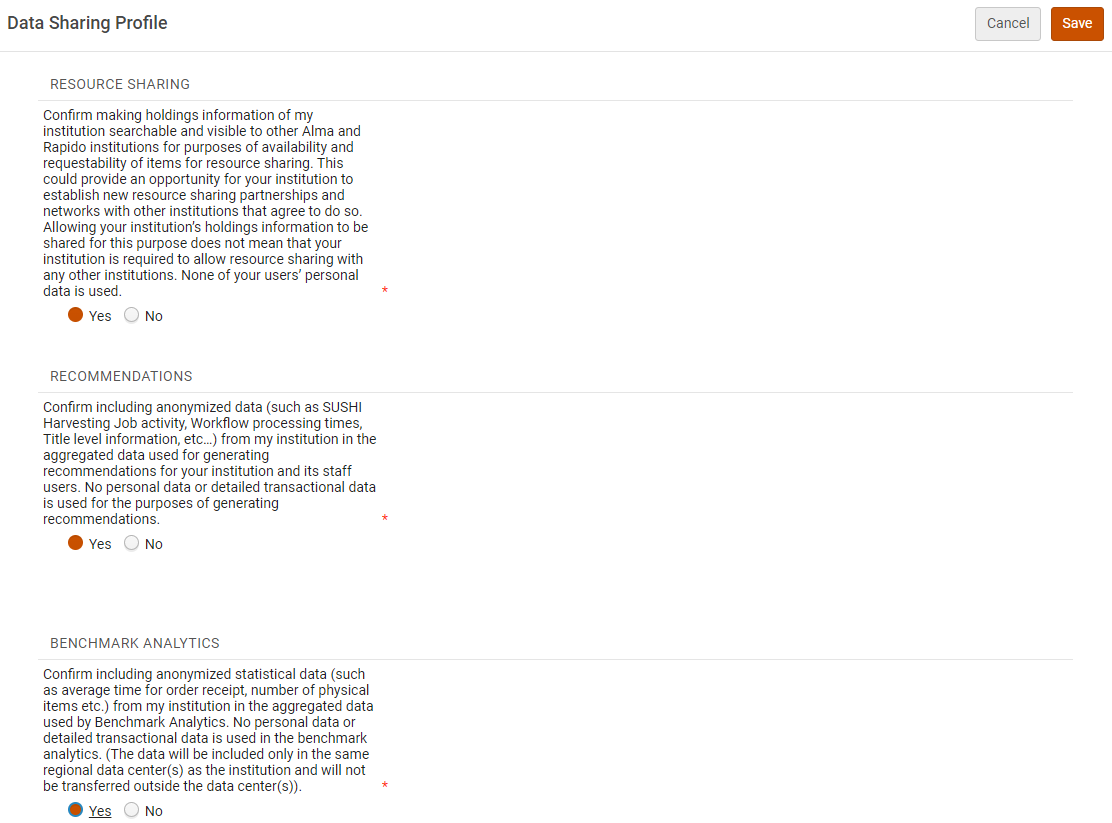Data Sharing Profile
- General System Administrator
Overview
Frequently Asked Questions
Title level holdings, non-identifiable fulfillment and reading list statistics will be included. The data will be anonymized. There will be no way to identify the source of the anonymized data (i.e. the institution or any individual).
No personal data of any kind or financial data (funds, orders, invoices etc.) are included in these new analytical capabilities.
Individual users' information--personally identifiable or otherwise--is not part of the data used. For example, usage information comes in the form of loan or electronic access count, wholly decoupled from user information.
Your institution's data will be anonymized prior to being included with similar data from other participating institutions. This includes obscuring all information linked to your institution, including institution codes and identifiers.
No. The anonymization of the data ensures the participating institution could not be identified or approached in any way.
Yes. You can opt-out at any time. Should you withdraw from including your data, all your data will be removed from the community data and from the Collection Development and Selection analysis.
NO. When an institution opts in and agrees to share their data, only the specific institution data is shared, not the network's institution or any network member.
Data Sharing Profile
Resource Sharing
Resource Sharing enables institutions to shareholding information for resource sharing purposes. When set to Yes, this indicates that the institution has agreed to share its information. The default setting for this option is No. We strongly recommend setting this option to Yes.
Recommendations
Benchmark Analytics
If you agree to allow your anonymized statistical data to be aggregated and at a future time you decide to no longer allow your anonymized statistical data to be aggregated, within one month your anonymized statistical data will be removed, and you will no longer see any statistical data in Alma Benchmark Analytics If you do not agree to allow your anonymized statistical data to be aggregated and at a future time you decide to allow your anonymized statistical data to be aggregated, within one month your anonymized statistical data will be added, and you will be able to take advantage of Alma Benchmark Analytics.
- The aggregated and anonymized statistical data will be used only within the same regional data center as the institution and will not be transferred outside the data center.
- It is not possible to create Alma Benchmark Analytics reports across regional data centers.
- Institutions that are live with Alma for less than a year and have agreed to share their anonymized statistical data can use and take advantage of Alma Benchmark Analytics, but their own data is not shared. Alma Benchmark Analytics only includes data that is at least one year old to maintain proper statistical formulas.
Configuration


